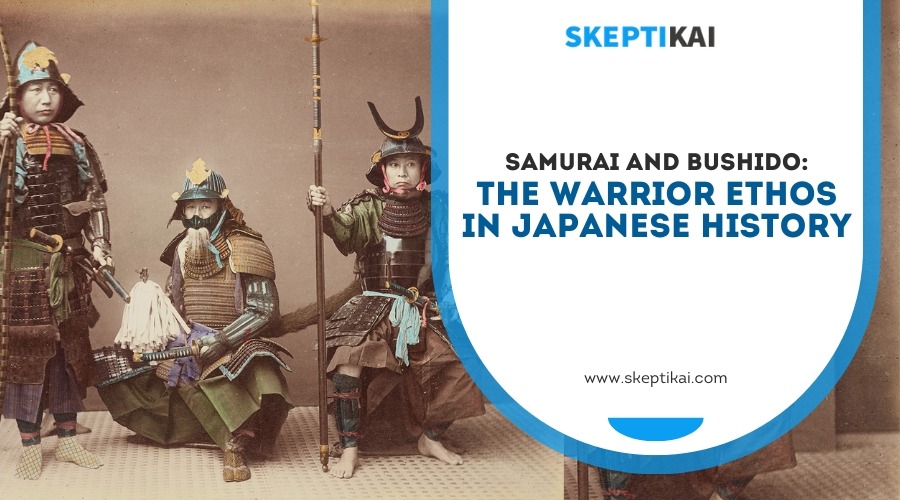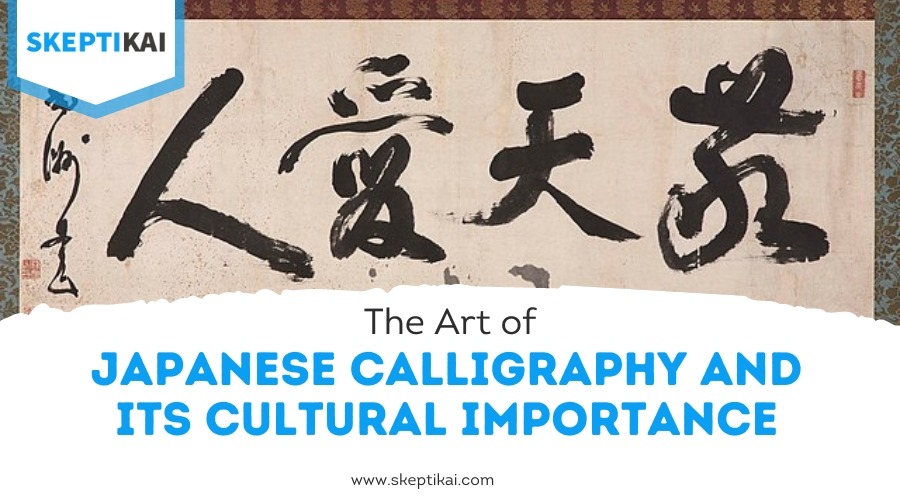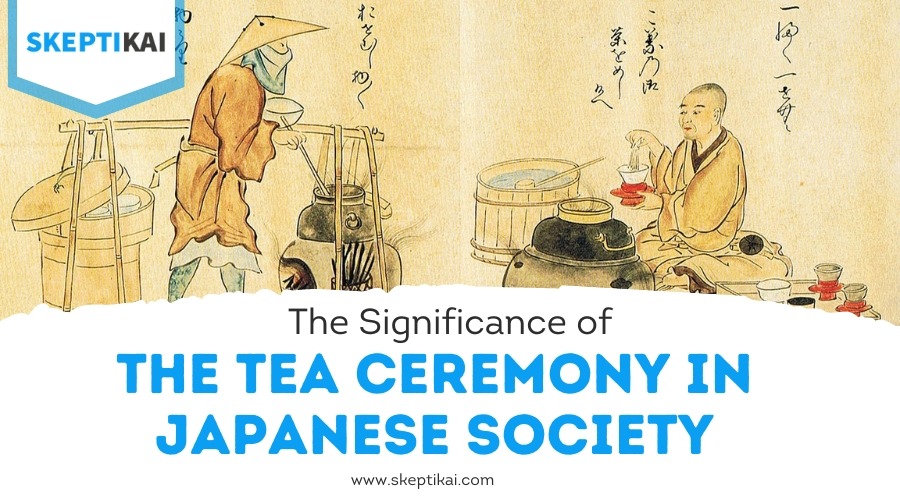How Did Tokugawa Shogunate Influence Japanese Society and Culture?
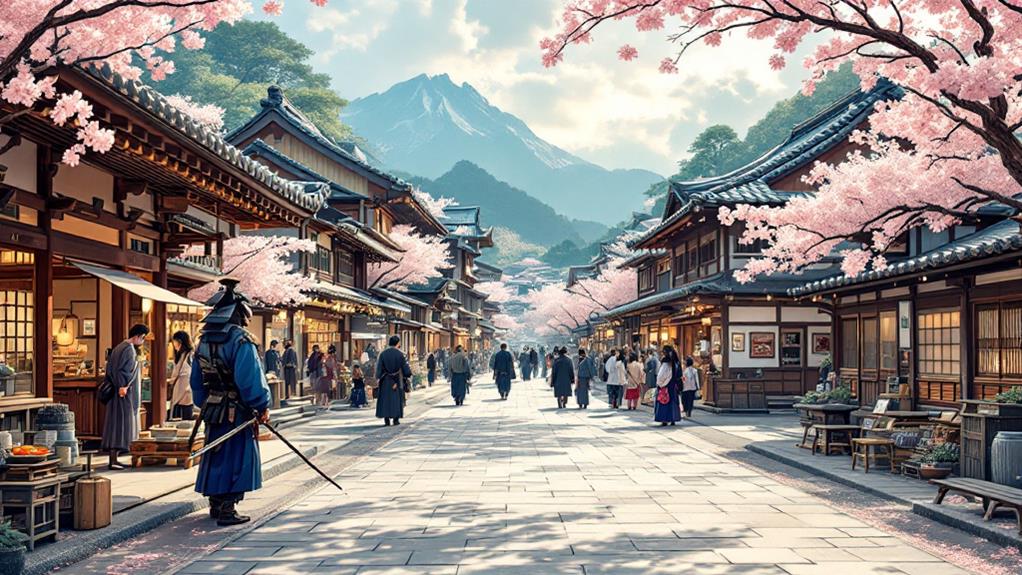
The Tokugawa Shogunate shaped Japanese society and culture in many ways. You'll notice a distinct social hierarchy with samurai at the top, restricting social mobility. National isolation policies limited foreign influence, preserving a unique cultural identity. Economic growth occurred through agricultural advancements and flourishing domestic trade. Urban centers thrived with lively cultures, where Kabuki theater and Ukiyo-e art flourished. The samurai code, Bushido, emphasized loyalty and honor, leaving a lasting ethical legacy. Confucian ideals influenced education and governance, stressing social harmony. The impacts remain evident today in Japan's societal values and traditions, offering much more to uncover.
Establishment of Social Hierarchy
During the Tokugawa Shogunate, a rigid social hierarchy became deeply entrenched in Japanese society. You'd find yourself maneuvering a feudal structure that dictated your every move and relationship. Society was divided into four main classes: samurai, farmers, artisans, and merchants, with each class having clearly defined roles and responsibilities. The samurai were at the top, serving as the ruling military class and enforcing the shogunate's laws. Their loyalty to their daimyo (feudal lords) was paramount, ensuring the shogunate's power remained unchallenged. This period laid the groundwork for modern education practices during the Meiji period, where a centralized education system was established to foster a shared national identity influenced by Western models.
For you, social mobility was practically non-existent. Birth determined your place in society, and there was little hope of moving up the ladder. The farmers, who comprised the bulk of the population, were responsible for producing food and paying taxes, but they had little control over their land or livelihoods. Artisans and merchants, although significant for their crafts and trade, were considered lower in status, with merchants at the very bottom despite their growing economic influence.
This feudal structure created a stable yet stagnant society where innovation and progress were secondary to maintaining order and control. Your life was largely defined by the class you were born into, limiting personal growth and aspirations.
Policies of National Isolation
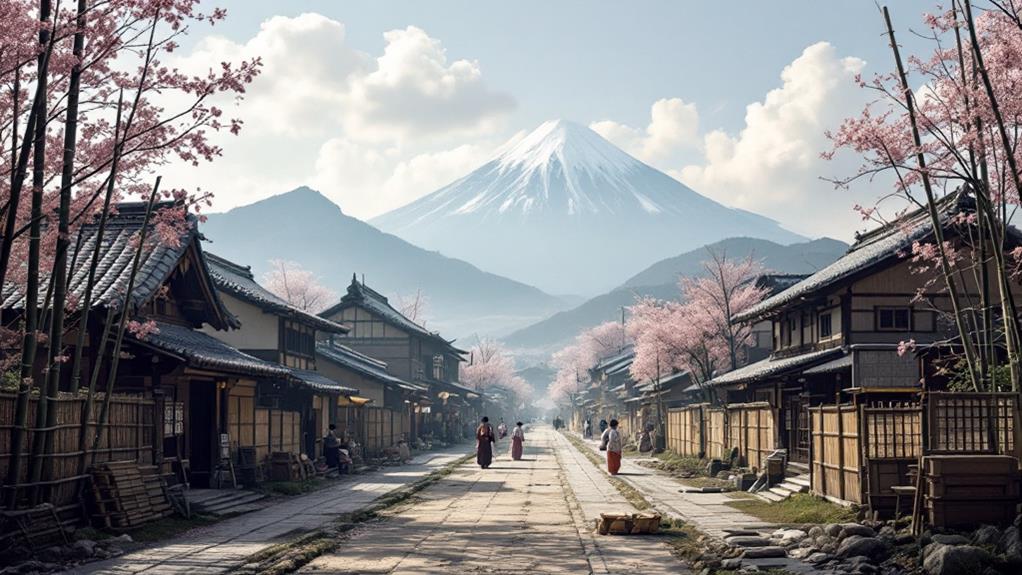
Isolationism characterized the Tokugawa Shogunate's foreign policy, shaping Japan's interactions with the outside world. During this time, traditional techniques such as those used in kimono creation were preserved and refined, as the focus on internal cultural development increased. You'd find that the Shogunate implemented strict trade restrictions, limiting foreign relations to maintain control over maritime activities. By restricting international diplomacy, they aimed to prevent foreign influence and preserve Japan's cultural identity. The infamous sakoku policy enforced these restrictions, allowing only a few Dutch and Chinese traders to operate through designated ports like Nagasaki. This approach guaranteed maritime control, preventing other nations from establishing a foothold in Japan.
Cultural exchange under these policies was limited but not entirely absent. The Shogunate permitted some controlled interactions, allowing selective cultural elements to seep into Japanese society. These small exchanges introduced Western technology and scientific ideas, albeit in a highly regulated manner, guaranteeing they didn't threaten the existing social order.
The diplomatic isolation of the Tokugawa period fostered a unique Japanese culture, relatively untouched by external forces. While this limited engagement with the rest of the world, it allowed Japan to develop independently, focusing on internal affairs. The policies of national isolation not only shaped Japan's foreign relations but also influenced its cultural evolution, leaving a lasting legacy on its society.
Economic Growth and Stability
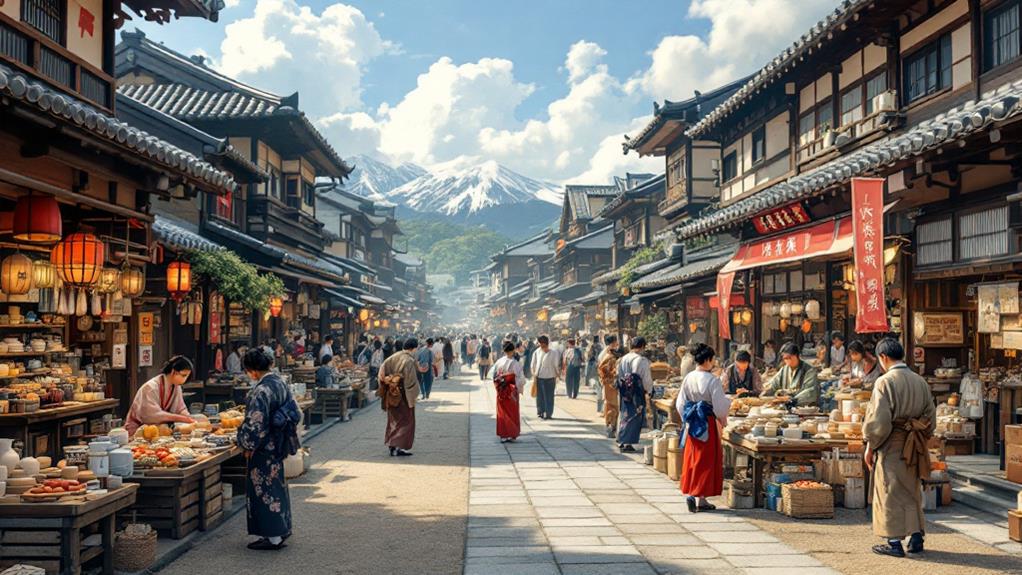
Under the Tokugawa Shogunate, Japan experienced significant economic growth and stability. You'll find that this period was marked by a series of smart economic policies and practices that led to prosperity. The government encouraged agricultural innovation, resulting in increased rice production, which was the backbone of the economy. Farmers adopted new techniques and tools, enhancing crop yields and ensuring food security across the nation.
Trade expansion also played a vital role during this time. Although Japan was isolated from much of the world, domestic trade flourished. The Shogunate built and maintained roads, facilitating movement and exchange of goods between regions. Merchants thrived, creating a network of trade routes that connected rural areas with lively markets in urban centers.
Moreover, the Tokugawa period saw the rise of a merchant class that contributed to economic stability. You'd notice how these merchants developed sophisticated economic practices, including credit systems and joint ventures, which laid the groundwork for modern business practices. The peace and order maintained by the Shogunate allowed these economic activities to thrive, ultimately leading to a stable, prosperous society that set the stage for future growth.
Development of Urban Culture

As Japan's cities grew and thrived during the Tokugawa Shogunate, you could see a lively urban culture emerging. The busy streets of Edo, Osaka, and Kyoto became hubs of innovation and social interaction. One of the key players in this colorful scene was the merchant class. They weren't just crucial in the economy; they were cultural trendsetters. Their rise in wealth and influence allowed them to patronize the arts and entertainment, shaping the urban culture around them.
Kabuki theater, a dynamic and colorful form of drama, became hugely popular, largely due to the patronage and enthusiasm of the merchant class. You could find Kabuki performances drawing large crowds, offering a mix of dance, music, and drama that captivated audiences. These performances weren't just entertainment; they reflected the society's values, struggles, and humor, often featuring stories that resonated with the common people.
The busy city life also fostered the development of teahouses, pleasure districts, and a new, lively nightlife. As a result, urban culture during the Tokugawa period became a melting pot of social classes, creating a rich tapestry of experiences and interactions unique to this time.
Influence on Art and Literature
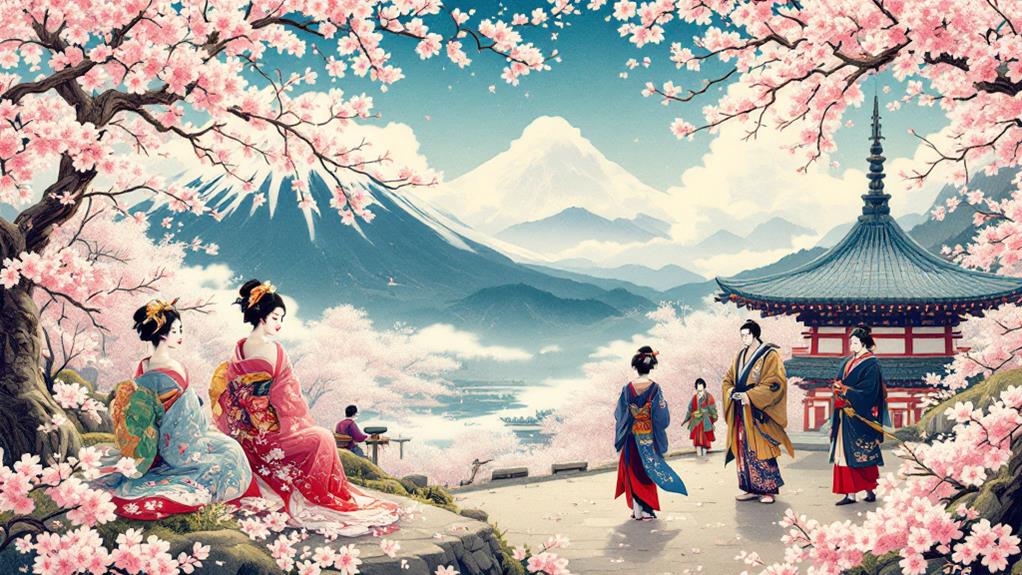
During the Tokugawa Shogunate, art and literature were profoundly shaped by the time's unique socio-political climate. You'd find Ukiyo-e prints capturing the ephemeral beauty of the floating world, reflecting the lively urban culture and the lives of ordinary people. These prints became emblematic of the period, illustrating scenes from Kabuki performances and the daily hustle of Edo. Meanwhile, Haiku poetry flourished, offering concise, evocative insights into nature and human emotion. With just 17 syllables, you'd investigate layers of meaning, echoing the Zen aesthetics that emphasized simplicity and profound depth.
In addition to visual arts and poetry, performance arts like Noh theater and Kabuki became central to cultural expression. Noh theater, with its minimalist and spiritual undertones, contrasted with the dynamic and colorful Kabuki performances that entertained the masses. Both forms reflected societal hierarchies and values, yet offered escape and reflection.
The Tea ceremony also thrived, embodying Zen principles of tranquility and mindfulness. This ritual became a microcosm of Tokugawa values, emphasizing harmony, respect, and purity. Through these diverse art forms, the Tokugawa Shogunate left an indelible mark on Japanese culture, blending tradition with evolving societal norms.
Codification of Samurai Ethics
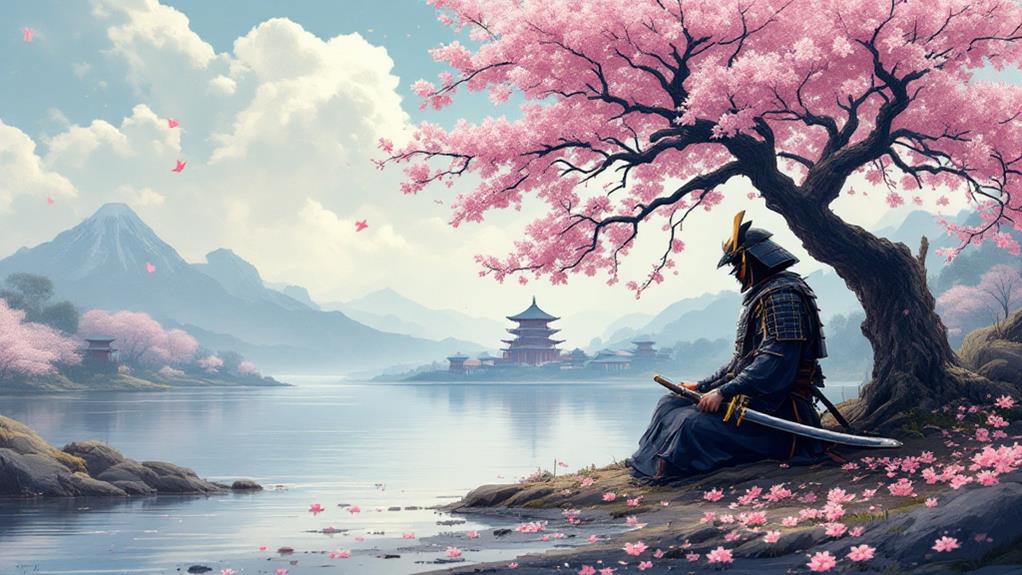
The Tokugawa Shogunate's legacy includes the formalization of samurai ethics, known as Bushido. During this period, the samurai code became deeply embedded in Japanese society. Bushido principles emphasized warrior ethics, focusing on discipline, duty, and the pursuit of perfection in martial traditions. These principles guided samurai behavior, ensuring they adhered to an honor system that dictated their actions both on and off the battlefield.
As a samurai, you'd follow a strict set of loyalty values, pledging unwavering allegiance to your lord. This commitment went beyond mere duty; it was an essential part of your identity. Ethical dilemmas were resolved by prioritizing honor and loyalty above personal gain, highlighting the significance of the samurai's moral compass.
Cultural rituals played a significant role in reinforcing these values. Ceremonies and practices, such as tea ceremonies and calligraphy, were not just artistic expressions but also opportunities to cultivate a disciplined mind and spirit. Through these rituals, you'd internalize the samurai code, living a life that aligned with Bushido principles. This codification of samurai ethics under the Tokugawa Shogunate left an indelible mark on Japanese culture, shaping societal norms and values for generations.
Role of Confucian Ideals
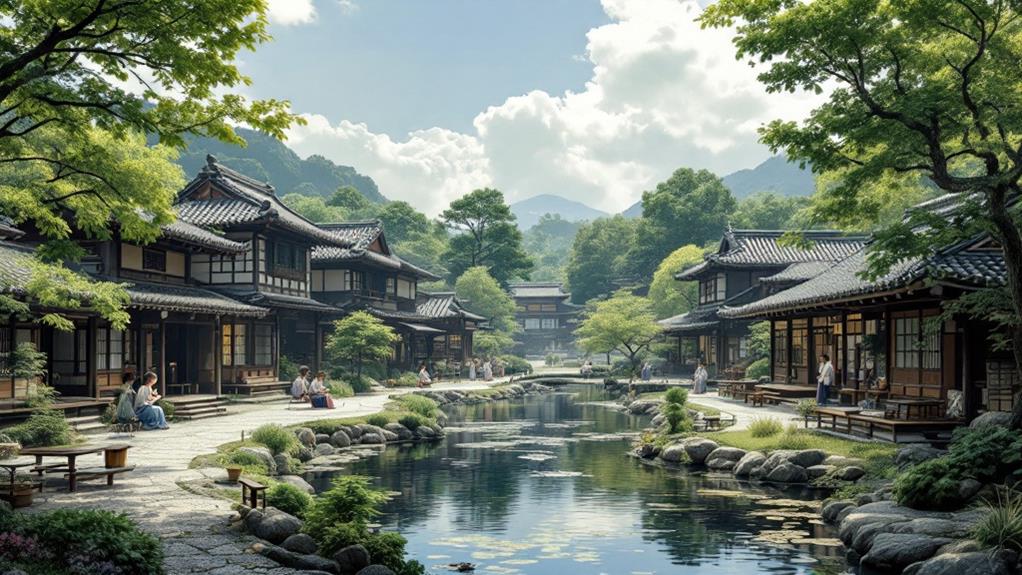
While Bushido shaped samurai ethics, Confucian ideals also played a significant role in molding Japanese society under the Tokugawa Shogunate. You can see Confucian influence in the emphasis on moral education and ethical conduct. It guided citizens to uphold virtues like loyalty and respect, fostering a community where social harmony thrived. Confucianism prioritized family values, underscoring the importance of filial piety and hierarchical relationships. These principles were mirrored in Japanese households, where respect for elders and maintaining familial duties became central tenets.
Governance principles during the Tokugawa period were also deeply rooted in Confucian thought. Leaders adopted these ideals to maintain order and stability, emphasizing hierarchy and duty. The shogunate used Confucianism to legitimize their rule, promoting a government that valued moral integrity and collective well-being over individual desires.
Moreover, the timeframe saw an increase in cultural exchange and scholarly pursuits, driven by Confucian ideals. Scholars studied Chinese classics, enriching Japanese intellectual life and encouraging a culture of learning. These pursuits nurtured a society that valued wisdom and moral character, laying foundations for a cohesive and ethically guided community. In this way, Confucian ideals deeply influenced Japanese culture and governance during the Tokugawa Shogunate.
Evolution of Japanese Education
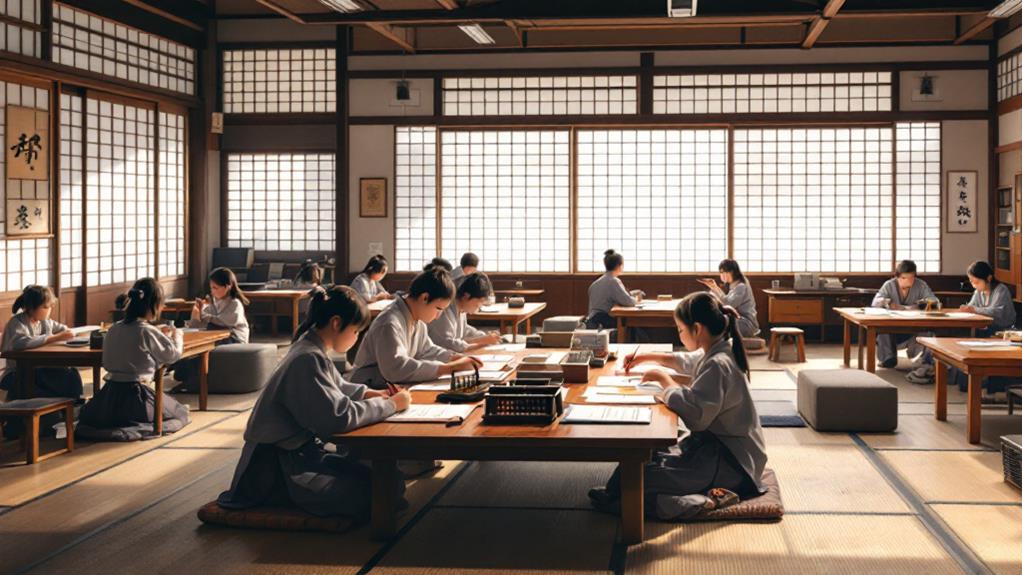
Education's transformation during the Tokugawa Shogunate laid the groundwork for modern Japanese schooling. As you investigate this period, you'll notice significant curriculum changes and educational reforms that shaped Japan's future. The shogunate established a school system influenced heavily by Confucian ideals, emphasizing moral education and character development. Teacher training became more structured, enhancing the quality of instruction and increasing literacy rates among the population.
Key Developments
- Curriculum Changes: Focus on Confucian texts and moral lessons.
- Vocational Training: Schools began offering skills-based education.
- Women's Education: Expanded opportunities for girls in certain regions.
Alongside moral education, vocational training became a crucial part of the curriculum. Schools taught practical skills, preparing students for specific trades and roles within society. Women's education, though limited, saw some progress, with regional differences playing a role in the availability and quality of instructional opportunities for girls.
Different areas of Japan developed distinct educational practices, reflecting regional differences in resources and priorities. These variances highlighted the shogunate's influence on the country's school systems. By the end of the Tokugawa period, these educational reforms and innovations had set the stage for the all-encompassing educational system that Japan enjoys today.
Legacy on Modern Society

Many aspects of modern Japanese society owe their roots to the Tokugawa Shogunate's policies and reforms. During this period, societal values emphasizing harmony, respect, and discipline became deeply ingrained. These values still shape your daily interactions and community identity today. The Shogunate's focus on cultural preservation guaranteed traditional festivals remain lively, celebrating Japan's rich history and fostering a shared historical memory.
In terms of governance, the Tokugawa period laid the groundwork for modern administrative structures. You can see its influence in Japan's efficient bureaucratic systems, which prioritize order and stability. This legacy of modern governance continues to impact how policies are implemented and how societal needs are addressed.
Traditional festivals like Obon and Hanami connect you to your past, reminding you of your roots while reinforcing community bonds. Through these celebrations, cultural preservation thrives, maintaining a link between past and present. The historical memory nurtured during the Shogunate period encourages you to value continuity and respect traditions.
In essence, the Tokugawa Shogunate's legacy permeates diverse facets of Japanese life. It shapes societal values, influences governance, and preserves cultural heritage, guaranteeing that Japan's unique identity endures in a rapidly changing world.
